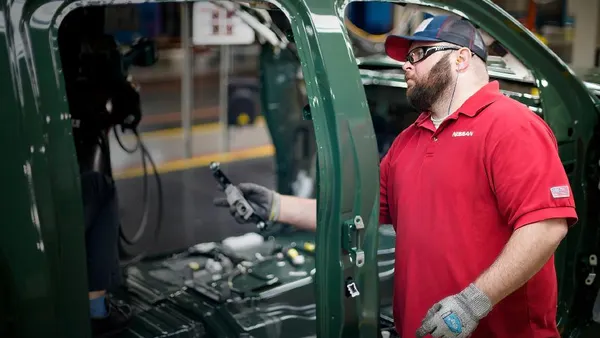Dive Brief:
- President Donald Trump said he will impose tariffs on all imports to the U.S. of steel and aluminum, the Associated Press reported.
- The tariffs are expected to go into effect next week, with 25% on steel and 10% on aluminum. Trump said the tariffs would remain in place for "a long period of time."
- In a tweet, Trump described U.S. steel and aluminum industries as "decimated by decades of unfair trade and bad policy."
Our Steel and Aluminum industries (and many others) have been decimated by decades of unfair trade and bad policy with countries from around the world. We must not let our country, companies and workers be taken advantage of any longer. We want free, fair and SMART TRADE!
— Donald J. Trump (@realDonaldTrump) March 1, 2018
Dive Insight:
Facing high taxes on critical raw materials, several manufacturers in the U.S. will be forced to adjust their supplier base to cope with rising costs.
Some companies may shift their sourcing to materials from within the U.S., rather than from overseas. That's largely the goal of Trump's tariff decision, as he's touted a mantra of "America First." Manufacturers faced a similar conundrum in January when the administration slapped tariffs on solar imports.
Although the newest tariffs apply to steel and aluminum imports from all countries, Washington pundits believe the move is primarily aimed at China — the country produces about half of the steel in the world.
For global companies, the tariffs may have the opposite effect of the Trump administration's intention. If costs skyrocket, they could shutter their operations in the U.S., in favor of factories in China and Brazil, where steel is abundant and labor tends to be cheaper.
The tariffs will be especially taxing for the automotive sector, which relies heavily on aluminum and steel to manufacture its products.
In a statement to Reuters, Toyota said the tariffs would "adversely impact automakers, the automotive supplier community and consumers," by raising costs for the automaker, and eventually prices on its vehicles.
Auto supply chains are already undergoing rapid transformation as automakers produce electric vehicles and autonomous technology. Tariffs only add to the shifting climate, and require even greater resilience from the auto industry.














